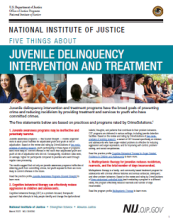Treatment
The Treatment Group and Recidivism: A Multilevel Analysis of Prison-Based Substance Abuse Treatment
Sex Offender Supervision: Communication, Training, and Mutual Respect Are Necessary for Effective Collaboration Between Probation Officers and Therapists
Criminal offense charges in women: A 10-year follow-up of an RCT of treatment foster care Oregon
Guiding Officers to Deflect Citizens to Treatment: An Examination of Police Department Policies in Illinois
A randomized controlled trial of Co-response for Mental Health Calls for Service to the Police in Fort Collins, CO
NIJ Multisite Impact and Cost-Efficiency Evaluation of Veterans Treatment Courts
Expanding Mental Health Diversion Opportunities: A Prospective Evaluation of the Los Angeles County Intake Booking Diversion Program
Mental Health in the Criminal Justice System-The Effect of Mandating Treatment for Convicted Individuals
What Works to Reduce Violent Gun Crime in Focused Deterrence Initiatives? Estimating the Effect of Services and Enforcement in Facilitating Desistence Among Prolific Violent Offenders
Meeting People Where They Are to Improve Institutional Culture
Incarcerated individuals deserve opportunities for healing and growth, but they often lack the necessary resources for such opportunities. Additionally, organizational cultures that don’t support these outcomes often stand in the way. Researchers and practitioners gathered at NIJ’s 2023 National Research Conference to share ideas and projects that will increase opportunities for incarcerated populations around the country. This show continues their conversation.
Emerging Disparities in the Placement of Law Enforcement-Based Treatment Referral and Recovery Programs
The MSIS: The Model Standards Implementation Scale
School Safety: Large, Metropolitan District Tests Various School-Based Mental Health Services
School Safety: Large, Metropolitan District Tests Various School-Based Mental Health Services
An assessment of the relative benefits of expanded and enhanced mental health services yields mixed results, underscores implementation challenges.
What works to reduce violent gun crime in focused deterrence initiatives? Estimating the effect of services and enforcement in facilitating desistence among prolific violent offenders in Tampa
Assessing the impact of treatment quality, matching and dosage on juvenile justice outcomes among a statewide sample of youth with co-occurring substance abuse and mental health disorders
"Shadow Costs: The Effect of Economic and Informational Inequality on Court-Order Compliance".
NIJ Multisite Impact and Cost-Efficiency Evaluation of Veterans Treatment Courts
Taking Stock: An Overview of NIJ's Reentry Research Portfolio and Assessing the Impact of the Pandemic on Reentry Research
Over several decades, the National Institute of Justice (NIJ) has made significant contributions to the field of reentry, specifically what works for whom and when. In recent years, however, the global pandemic has made it increasingly difficult to conduct research on and with populations involved with the justice system. During this time, many researchers assessing various justice-related outcomes were unable to continue their inquiries as planned due to a lack of access to their populations of interest, forcing many to pivot and rethink their research designs.
See the YouTube Terms of Service and Google Privacy Policy
Reentry Research at NIJ: Providing Robust Evidence for High-Stakes Decision-Making
NIJ is committed to promoting rigorous research on how best to successfully integrate individuals returning from jail or prison.




